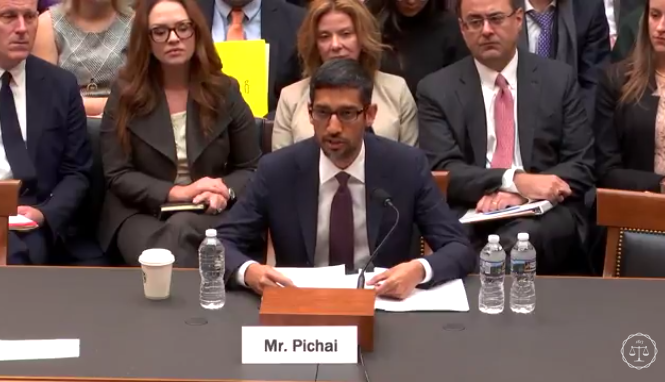House Judiciary Grills Google CEO

The smarter way to stay on top of broadcasting and cable industry. Sign up below
You are now subscribed
Your newsletter sign-up was successful
Google CEO Sundar Pichai knew early on the tenor of the Hill hearing at which he testified Tuesday (Dec. 11).
House Majority Leader Kevin MacCarthy (R-Calif.) provided an opening statement in which he said that there was a widening gap of distrust between tech companies and the American people. He said he hoped that gap could be closed, but that the committee needed answers. Chief among them was whether tech companies were instruments of freedom or of control.
MacCarthy also spent some time on the allegations of anti-conservative bias. He said that Congress needed to be sure that any any political bias in Google's workforce does not creep into search algorithms.
The political bias issue dominated the hearing, with Democrats saying that was a conspiracy theory and Republicans coming back to it again and again with what they said was evidence of bias.
He also raised the issue of Google working on a version of its search engine for China.
Pichai was testifying at a house Judiciary Committee hearing Dec. 11 entitled "Transparency & Accountability: Examining Google and its Data Collection, Use and Filtering Practices."
Not surprisingly, Pichai accentuated the positive in his testimony, pointing out that in the past year the company "supported" over 1.5 million U.S. businesses, and in the past three years contributed $150 billion directly to the U.S. economy, added 24,000 more staffers and paid $43 billion to partners across its search, YouTube and Android platforms.
The smarter way to stay on top of broadcasting and cable industry. Sign up below

He told the committee that protecting privacy and security was a priority, which is why Google supported federal privacy legislation.
Judiciary chairman Bob Goodlatte (R-Va.) followed on MacCarthy's statement by saying that he was concerned that Google's power had the potential for wide-ranging abuse, including of free speech. He also said he was concerned that Google could be censoring conservative voices.
Goodlatte pointed to Google's search engine and its tracking of data via the Android platform.
Goodlatte did say Google was still the story of the American dream, founded by two entrepreneurs in a garage. He saluted Google's innovative services, but mostly he had concerns and wanted answers.
Rep. Lamar Smith (R-Tex.) said Google could well elect the next President, with dire consequences. He said there was an anticonservative political bias baked into the company. Smith was laser focused on the political bias, which he said was irrefutable. Pichai said he disputed the characterization and the studies they were based on. He said the company had a wide variety of sources from both sides of the aisle.
Smith asked whether Google would be willing to have a third party evaluate its search. Pichai said there already had been such evaluations, but Smith said he believed they were all third parties picked by Google. Pichai also said employees can't manipulate its search algorithms.
Rep. Steve Chabot (R-Ohio) said he believed there was a conservative bias and that he did not buy the "Google attitude," which he said was "The algorithm made us do it."Rep. Darrell Issa (R-Calif.) said that if you measure the outcome of Google search, there is at least an appearance of bias. He asked Pichai to commit to look at the outcome, measure that and see if there is evidence of bias. It may be that there is just an overzealous liberal crowd making more noise, Issa said. Pichai said he understood Issa's concerns and would be "happy to engage."
Ranking member Rep. Jerry Nadler (D-N.Y.) also talked of Google's dominance and said he had issues with content moderation. But he called it a fantasy that Google and other Silicon Valley companies had an anti-conservative bias, which he called right-wing propaganda and a conspiracy theory. Nadler said that even if Google were biased against conservatives, that was its right, just as it was Fox News' right to be biased against liberals and it was not something the government should be getting involved in.
Nadler brought up the FCC's long-invalidated fairness doctrine and said Republicans might want to bring that back, aimed at liberals, though he doubted that would be the case.
The fairness doctrine was the FCC policy requiring broadcasters to seek out alternative views on issues of public importance. Conservatives fought against it and the rise of conservative talk radio was traced to the FCC's dropping of that doctrine in 1987. Some Democrats called for its return as a check on conservative talk radio, but that has not gained any traction.
But Nadler had issues with data privacy, hateful or biased speech, and also raised the issue of the Chinese search engine. Pichai said the company has no plans to launch search in China.
Pichai said of the Android platform that Google gave consumers choice and transparency, but never quite conceded the massive volume of data Google was collecting on android users.
Goodlatte pointed to the Communications Decency Act, which allows Google to screen out certain illegal or inappropriate content. Pichai said he would be willing to sacrifice some business to weed out some content.
Pichai said its advertising products are developed without bias, but that ad rates for candidates can vary, including substantially, but not for political purposes. Goodlatte pointed out that was different from broadcasting, where political ads have to be offered at comparable rates to all comers.
Nadler grilled Pai on disclosing bugs that don't involve sensitive financial info, but still impact user personal info.
Pichai said whenever it finds any bugs, it is escalated to a privacy issue and will do "the right thing for our users."
Nadler said Russian agents bought Google and YouTube ads as part of its election-meddling. He asked if Pichai knew the extent to which its platform was used. Pichai told Nadler there were only two Russian-linked ad accounts buying ads totaling only $4,700 in ads. He said there was limited activity from Russian- and Iran-linked accounts in the last election.
Asked about white supremacy on YouTube, Pichai said they wanted to be open to different kinds of speech, but has clear policies against hate speech and takes down the content when it finds it.
Contributing editor John Eggerton has been an editor and/or writer on media regulation, legislation and policy for over four decades, including covering the FCC, FTC, Congress, the major media trade associations, and the federal courts. In addition to Multichannel News and Broadcasting + Cable, his work has appeared in Radio World, TV Technology, TV Fax, This Week in Consumer Electronics, Variety and the Encyclopedia Britannica.

